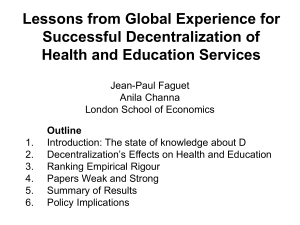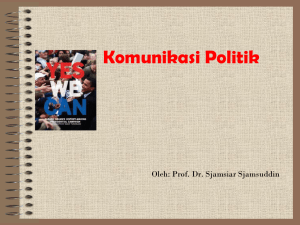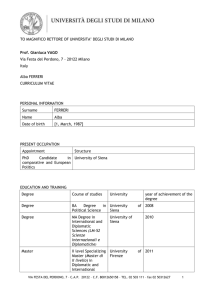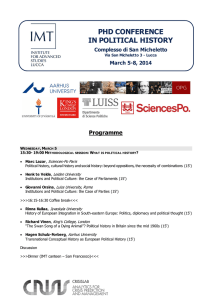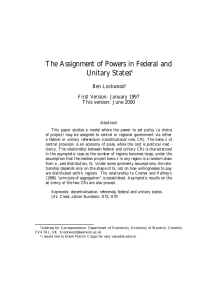EKONOMI POLITIK DESENTRALISASI (KASUS POSISI
advertisement
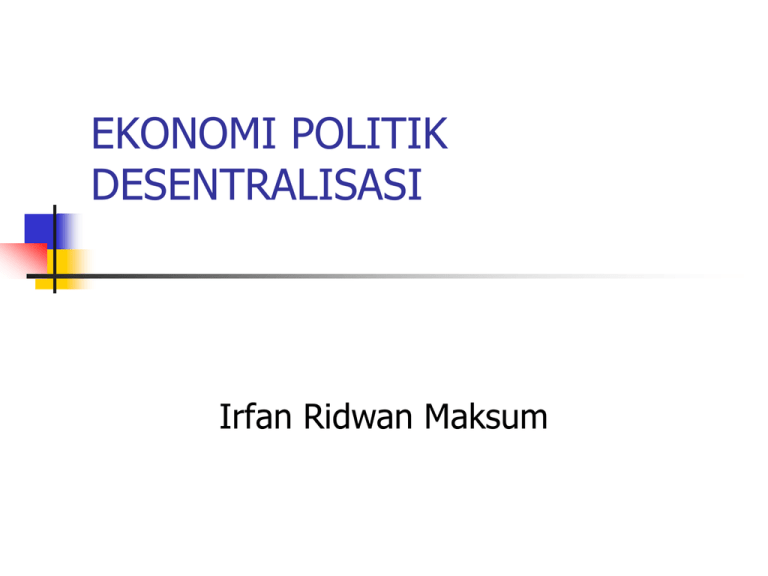
EKONOMI POLITIK DESENTRALISASI Irfan Ridwan Maksum Desentralisasi membawa adanya otonomi daerah dalam sebuah negara bangsa Makna Perspektif ekonomi-politik institusi pemerintahan daerah. Dampak ekonomi dan dampak politik pelaksanaan desentralisasi (otonomi daerah) Pendekatan ekonomi terhadap pelaksanaan desentralisasi (otonomi daerah). Pendekatan politik terhadap pelaksanaan otonomi daerah. Perspektif public choice dalam pemerintahan daerah. a. Ekonomi Politik Pemda Pemda dapat merupakan perpanjangan tangan Pemerintah sebagai agen kapitalis (Marksis) Pemda merupakan alat pendemokrasian (pluralis-public choice) Pemda merupakan alat pemberi layanan bagi masyarakat yang efektif (Weberian) MARXISM 1. INSTRUMENTALIS COCKBURN (1977): “LOCAL GOVERNMENT IS NOTHING MORE THAN AN EXTENSIVE OF THE CENTRAL STATE, DESIGNED TO ENSURE THE CONDITIONS THROUGH WHICH CAPITALISM CAN BE PRODUCED LOCALITY” C.2. STRUCTURALIST CASTELLO (1977): “THE LOCAL STATE, IS ULTIMATELY SEEN AS A MEANS OF ORGANIZING “COLLECTIVE CONSUMPTIONS”, IN ESSENCE PUBLIC SERVICE SUCH AS HEALTH, EDUCATION, HOUSING, AND PUBLIC TRANSPORT WHICH PLAYS A DUAL ROLE OF ENSURING CAPITALIST REPRODUCTION AND APPEARING SOCIAL CONFLICT”. Pluralis “ON THE BASIS OF THIS ANALYSIS HE SUGGESTED THAT LOCAL POLITICAL SYSTEM WAS CHARACTERIZED BY A SET OF DISPERSAL INEQUALITIES, WHEREBY DIFFERENT INDIVIDUALS AND GROUPINGS OF WHICH WILL VARY SIGNIFICANTLY FROM ONE POLICY AREA TO ANOTHER. THUS, IT IS IMPOSSIBLE FOR ANY SINGLE GROUP TO DOMINATE LOCAL GOVERNMENT DECISION MAKING” Lanjutan “AS A RESULT, POLITICAL OUTCOMES ALWAYS TEND TO REFLECT THE VIEWS OF THE MAJORITY AND ARE PRODUCED VIA CHANGE THAT CONSTITUTE THE RELATIONS OF LEADERS AND CITIZENS IN PLURALIST DEMOCRACY” “CLEARLY, PLURALISM PRESENTS A HIGHLY SANGUINE VIEW OF LOCAL GOVERNMENT. IT ASSUMES THAT LOCAL DECISION MAKING SYSTEM IS OPEN AND TRANSPARENT AND THAT IT WILL, DESPITE ITS COMPLEZ CHARACTER. ALWAYS BE RESPONSIVE TO THE WILL OF THE MAJORITY” b. Dampak ekonomi dan Politik Dampak ekonomi dihitung melalui tingkat kesejahteraan, pertumbuhan ekonomi, dan keberlanjutan pembangunan. Seringkali diukur dengan net income per capita, PDRB, GNP, GDP dan ukuran ekonomi lainnya. Lanjutan Dampak politik biasanya ditentukan melalui indeks gini, keadilan, pemerataan pembangunan, askes masyarakat bawah, demokrasi dan partisipasi, kemandirian, kebebasan dan transparansi Seringkali digambarkan melalui pengembangan institusi demokrasi OECD (2004) DAMPAK POLITIK DARI DESENTRALISASI TERHADAP KEMISKINAN Political or democratic decentralization is expected to offer citizens the possibility of increased participation in local decisionmaking processes, from which they have generally been excluded through lack of sufficient representation or organization. lanjutan Improved representation of formerly excluded people in local municipalities could, in turn, give the poor better access to local public services and social security schemes, reducing vulnerability and insecurity. Lanjutan In ethnically divided countries, decentralization could also offer a way to share the power between local ethnic groups, thereby establishing grounds for political consensus and stability. lanjutan A stabilized political system offers a foundation for the poor to build up their life and to begin investing. More generally, it can also contribute to a reduction in their vulnerability to shocks DAMPAK EKONOMI DARI DESENTRALISASI TERHADAP KEMISKINAN With respect to the economic channel, decentralization is expected to have a strong and positive impact on poverty through increased efficiency and better targeting of services lanjutan Enhanced efficiency in service provision could directly improve poor people’s access to education, health, water, sewage and electricity, highly important poverty-related concerns Lanjutan Delegating power and resources to the local level may also lead to better targeting of the poor. A more decentralized framework to identify and monitor programs and projects could not only help to reduce costs but also to reach those most in need. In addition, it would enable greater responsiveness to local needs. REKOMENDASI --lanjutan In these countries, pro-poor effects can be achieved if the weakness of the state is tackled by: — supporting de-concentration as a first step towards decentralization; lanjutan — supporting community participation and capacity building of local stakeholders; and — promoting further research on best practices of how decentralization can be designed in a pro-poor manner. c. Pendekatan Ekonomi terhadap pelaksanaan Desentralisasi (otonomi daerah) Sentralisasi membuat daerah-daerah kaya dalam sebuah negara harus kehilangan benefit tetapi daerah-daerah miskin mendapatkan benefit. Sedangkan desentralisasi dapat merasakan lebih banyak benefit. Secara politik, sentralisasi membuat daerahdaerah kaya kurang terdorong untuk mengembangkan potensinya, sedangkan desentralisasi membuat lebih terdorong untuk menggali potensinya. d. Pendekatan Politik dalam desentralisasi (James Manor) Menguraikan dampak desentralisasi terhadap pembangunan perdesaan (pertanian) di sejumlah negara khususnya negara-negara berkembang dan negara-negara terbelakang Elemen kepemimpinan nasional terkait dengan sentralisasi dan desentralisasi cukup menentukan keberhasilan desentralisasi di suatu negara Elemen elit lokal menentukan pula bagi keberhasilan program-program desentralisasi di negara terbelakang dan berkembang. Rosenbloom dan Kravchuk (2005) “The orthodox approach to public organization addresses the question of centralization versus decentralization from the perspective of efficiency and economy. Decentralization in the sense of establishing field office and regional office is considered useful in making government service available to the citizenry. But decentralization also complicates coordination and control of administrative units. Hence, a balance must be struck at some point.” Smith (1986) “…why institutional political action seems inevitably to create centralization,…” “First, organizations are in their very nature coordinating mechanisms…Secondly, and a point closely related to the way in which public policy itself creates spatial politics,…and other dependent categories have to be translated into a central institutional language,…Thirdly, hierarchy is important for understanding centralization…Fourth, the ‘monocratic’ peaks of pyramidal organizations are spatially centered in urban, core and capital locations. This emphasized the political significance of centrality.” Samoff (1990) “In part, the debate about decentralization has to do with the appropriate balance centralized authority and local initiative. …That is, decentralization was a strategy for extending central authority by depoliticizing the local populace, by controlling the actions of local government institutions, and by socializing a ‘collaborative political leadership’. Lanjutan “Although the limited devolution that occurred may eventually provide some political maneuvering room for local activities, in the short term decentralization was intended to deflect protest from the national to local government and thereby reinforce central authority.” e. Public Choice desentralisasi Di level Pusat terdapat aktor-aktor: Pemerintah Pusat yang terdiri dari berbagai departemen, Aktor Pebisnis Nasional dan Internasional, aktor lembaga donor internasional, pemerintah negara lain, tokoh politik nasional, NGO’s Nasional dan Internasional Di level lokal terdiri dari Pebisnis lokal, birokrat lokal, tokoh masyarakat, tokoh politik lokal, NGO’s lokal, dan masyarakat lokal Di setiap bidang permasalahan sampai pada pemerintahan daerah secara umum, dan dari formulasi kebijakan sampai pengawasan. Pendekatan Bromley --simplifikasi Tergantung dari lingkup persoalan pemerintahan daerah, dapat diamati secara kelembagaan pola interaksi antar aktor dalam pelaksanaan desnetralisasi melalui berbagai level pengamatan berikut: Level institusional Level organisasi Level operasi Level interaksi individu (aktor-aktor organisasi pelaksana dan stakeholder)
